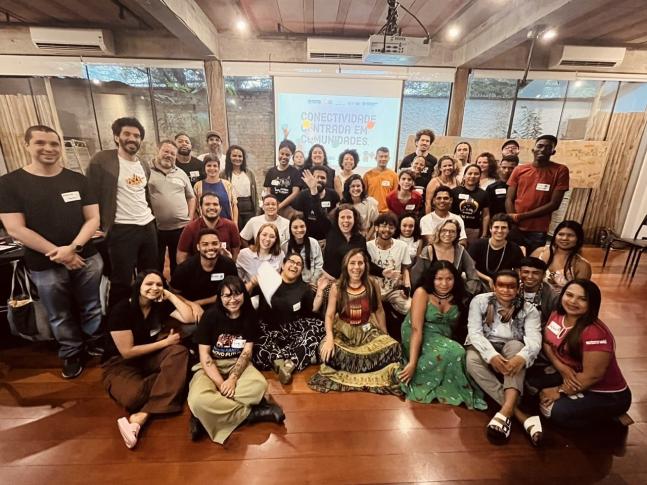
* This letter is an update of the one originally published on 15 November 2022 which was the result of the “Encontro de Redes Comunitárias de Internet” (Meeting of Internet Community Networks) held in São Paulo on 10 and 11 November 2022. This version was drafted following the “Encontro de Conectividade Centrada em Comunidades” (Meeting on Community-Centred Connectivity) held in São Paulo on 17, 18 and 19 October 2024.
We, the members of the Brazilian National Committee of Community Networks, are sharing this letter to:
– Express our appreciation and respect for the diversity gathered within the community networks, which bring together people from all regions of Brazil, representing collectives organised by Quilombola, Indigenous, rural, traditional and peripheral populations, self-organised producers and workers, riverside dwellers, fishers, shellfish gatherers, coconut breakers, traditional communal grazing communities, migrant populations and refugees. These networks also receive support from representatives of the technical community and educators from community associations and civil society organisations. This representation includes the participation of women, Black and Indigenous people, LGBTQIAPN+ individuals, and people of all ages, with a particularly strong youth presence. Recognising that the diversity of people building the community network movement in Brazil is even greater than expressed here, we:
– Express the core fundamental values that unite us in our diversity, such as autonomy, well-being, the preservation of biomes, collaboration, empathy, alliances among social movements and the defence of territories. Also, the community appropriation of social, free, and information and communication technologies, the valuing of local ways of life and knowledge and the multicultural existence of the Brazilian people;
– Reaffirm our commitment to digital inclusion through community networks, combining rights-based technological appropriation with participation in digital culture, connected to the development of free technologies, local content, participatory processes and digital care. Participatory processes involve collective decision-making spaces in which the community defines priorities and actions in an inclusive and horizontal way. Open meetings, assemblies and forums ensure that all voices are heard. The guarantee of active participation at all stages – from planning to ongoing management – strengthens shared responsibility and collective autonomy, promoting sustainability and self-management of community networks;
– Emphasise that community networks are part of the ecosystem of technological appropriation and digital culture, and form part of Brazil’s public policy guidelines on digital inclusion. They must therefore play an active role in the processes of discussion, development, implementation and evaluation of public policies on access and telecommunications. The inclusion of community networks in a decree from the Ministry of Communications is essential for this recognition;
– Highlight that information and communication technologies are indispensable for communities in ensuring fundamental rights, the right to communication and the defence of territories;
– Point out the common barriers faced by community networks in Brazil, such as the lack of public policies and enabling legislation, the absence of community networks as a beneficiary category in public calls for proposals, the need to democratise technical and regulatory knowledge, the lack of public and private financial resources to create and sustain community-led initiatives, the logistical and topographical challenges across different territories, the high costs charged by internet providers and the combination of lack of access with other rights violations;
– Assert our right to free digital territories and to the creation of an environment that fosters community network initiatives with informational and communicational autonomy, promoting knowledge sharing and the need to democratise communication and technical know-how, co-creation of technologies, expression of community content, preservation of memory, ancestry and native biomes, appreciation of orality, and the exchange of diverse knowledge;
– Underscore the importance of ensuring that public norms, policies and structures are implemented and upheld by the state, and not undermined by changes in government, which is fundamental to democracy;
– Call for the necessary measures to create this enabling environment, such as the establishment of public and private funds to support community networks, to promote technology and application development from within communities, to enable the acquisition of equipment and essential infrastructure, to ensure digital care, to guarantee the implementation of training activities, preferably within the territories, and to sustain the social and technical networks needed for the continuity of these networks, particularly by encouraging community-led management;
– Reiterate the importance of the concept of meaningful connectivity and of regularly collecting related data, such as the research conducted by NIC.br, considering both usage and quality indicators that reflect the realities of community networks and community-centred connectivity initiatives;
– Demand the inclusion, within public access policies, of co-constructed initiatives for technological, political and regulatory capacity building, and for strengthening forms of community self-management in the territories; the establishment of dialogue processes and the creation of safe spaces for talking and listening within participatory processes; and the implementation of support mechanisms to ensure the maintenance and sustainability of these networks – including guaranteed meaningful access to the internet and other community technologies to meet local needs at costs compatible with local realities, and, whenever possible, free of charge;
– Defend digital autonomy while respecting the preservation of biomes.
Through the sharing of experiences, knowledge, strategies and dreams, and by expressing the points gathered in this letter, we reaffirm our commitment to the collective struggle for the expansion and strengthening of community networks guided by the autonomy and freedom of the people.
São Paulo, 18 October 2024.